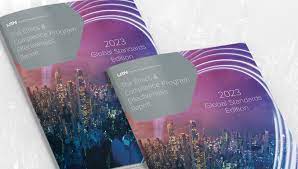LRN’s 2023 PEI Report: Values and Corporate Culture

LRN’s Report notes that its large data set contains the survey results from 1,860 ethics and compliance professionals from organizations around the world. As explained by LRN, the compliance industry continues to converge toward an international set of standards governing ethics and compliance programs, which are built around a code of conduct, policies and procedures, training, audit, due diligence, supply chain management and other essential elements.
LRN’s report cites several important findings:
High-performing ethics and compliance programs rely principally on values to motivate and guide ethical and compliant behavior — LRN’s Report confirms again that ethical principles are more effective than reliance on rules-based controls. High-performing companies embed their values and promote them through their its code of conduct, policies and procedures, C-suite communications, training and onboarding of new employees.

Respondents cited the importance of their ethical culture and values in handling serious challenges over the last few years — the pandemic, and the impact of the Ukraine-Russia war. in fact, most respondents noted that their ethical cultures were strengthened by the serious challenges they faced over the last four years.
LRN’s research confirmed — yet again — that ethical companies outperform companies in important areas: lower misconduct rates, employee loyalty, customer satisfaction, innovation and business growth.
High-performing ethics and compliance programs are embedded in the decision-making process of their companies — LRN’s Report underscores that high-performing companies have embedded their compliance programs in their business operations, and factor in ethical issues in normal business decision processes. Interestingly, almost 70 percent of respondents reported that consideration of ethics and compliance risks caused the company to substantially modify or abandon a business initiative.

High-performing programs make it easy for employees to access resources and place a premium on relevance — In response to remote working situations, companies have devoted resources to increase accessibility, simplicity and relevance. The list of specific actions include: (1) integrating major E&C elements into a mobile application; (2) simplifying compliance policies and procedures; (3) linking code of conduct to other policies and procedures; (4) updating code of conduct to address diversity, equity and inclusion and ESG initiatives, and real-life scenarios; and (5) posting code of conduct on web and offering interactive capabilities.
High-performing programs innovate in designing and delivering training — High-performing companies are relying on innovative training programs. One-hour lecture formats are no longer being offered. Instead, companies are embracing employee-focused training tailored to an employee’s role, region or seniority and offering shorter, more relevant training. An interesting development is the offering of “just in time” training programs that are triggered by internal systems such as expense reporting, travel or procurement.
High-performing companies are using data analytics to understand how employees interact with E&C training. Training analytics can include training time, course satisfaction, difficult topics and questions and employee comments.

One other interesting best practice — companies are offering a short ethical culture survey at the end of courses. This is a great idea that provides an important opportunity to monitor a company’s culture.
High-performing programs focus on personal responsibility for ethical and compliance conduct — LRN’s Report identified the continuing trend in the importance of ethics and compliance behavior as a factor in performance reviews, promotions, key hires (managerial, executive or control functions) and bonus allocations. High-performing programs have increased the importance of ethics and compliance as an important factor in bonus allocations.















